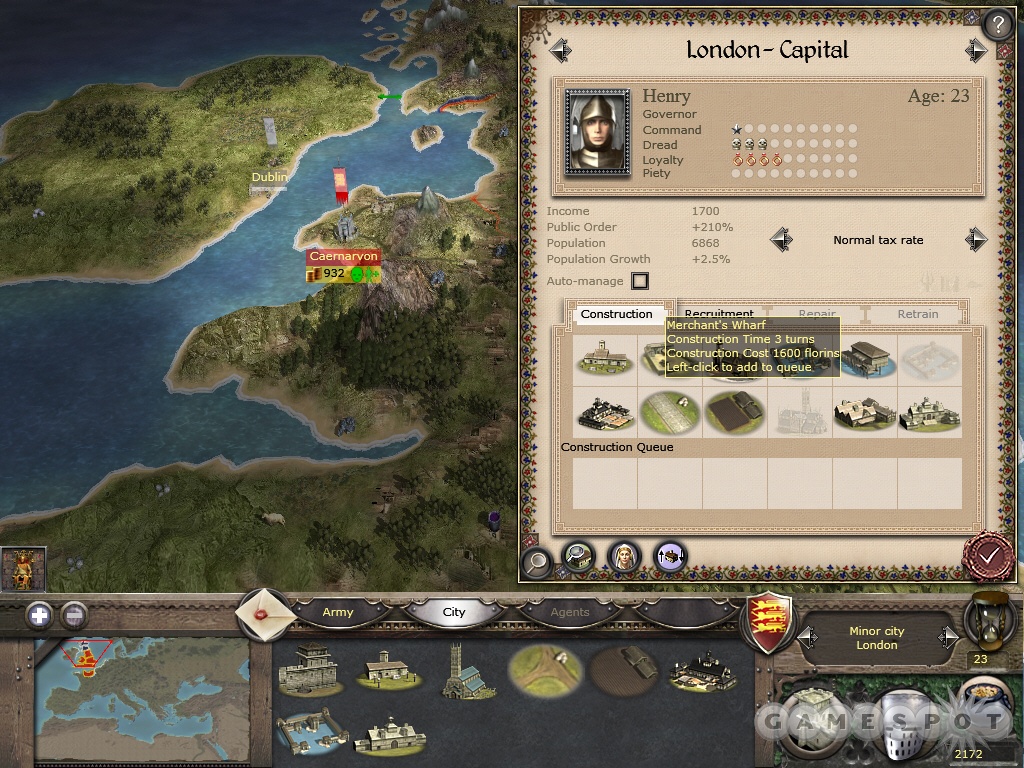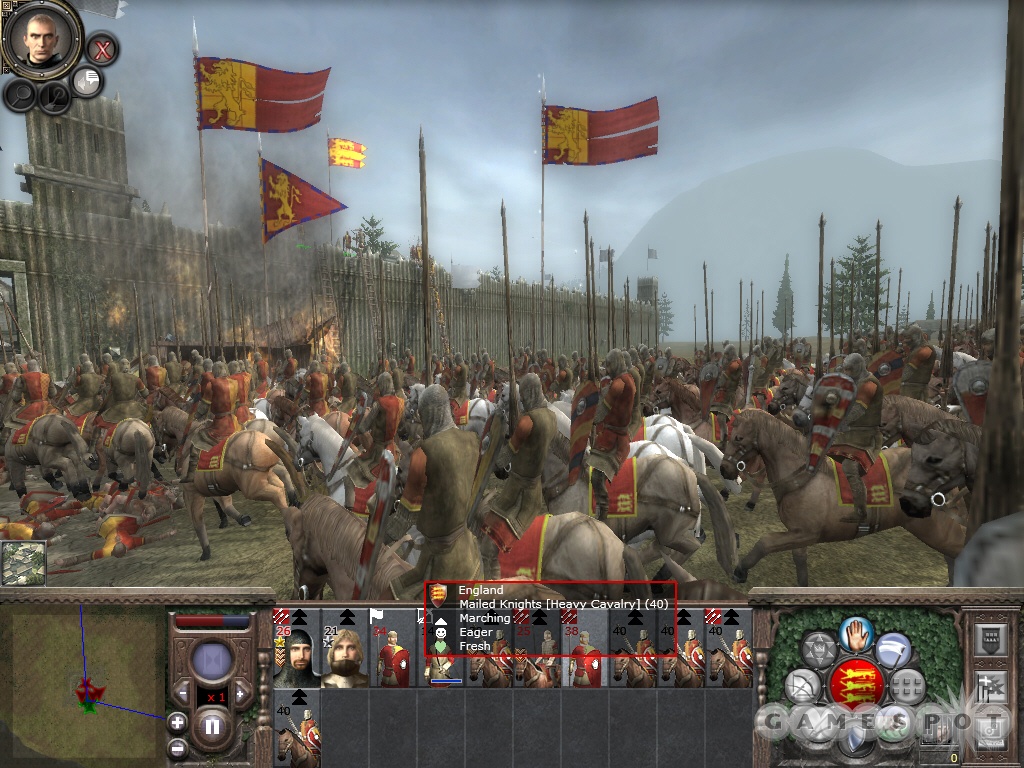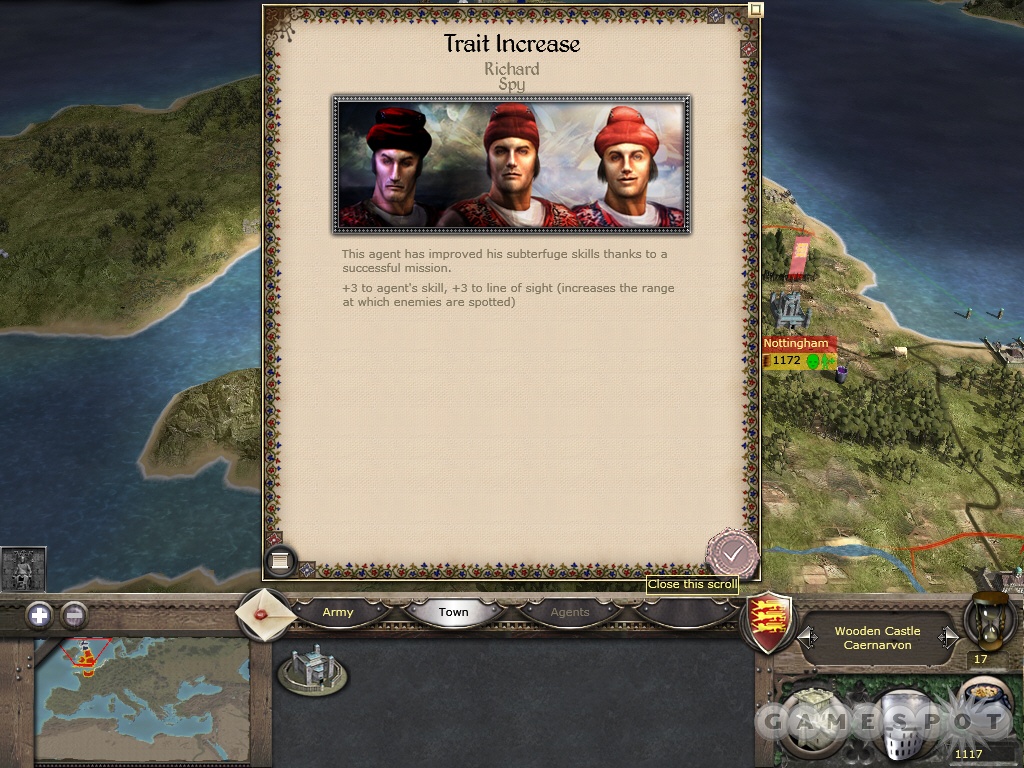Medieval 2: Total War Exclusive Hands-on - Conquering Europe One Territory at a Time
If you've ever wanted to cry havoc and let slip the dogs of war, then you'll probably want to check out our hands-on preview of this eagerly awaited medieval strategy game.
Over the course of three Total War games, developer Creative Assembly has managed to bring the historical world to life in a very unique way. Total War games differ from your traditional real-time strategy game as they blend a turn-based strategic layer with epic real-time battles that make you feel like a real general. After covering feudal Japan, medieval Europe, and ancient Rome, Creative Assembly returns back to Europe for Medieval 2: Total War. We recently got our hands on a work-in-progress version of Medieval 2, and being fans of the series, we dove in for a closer look.
This new Medieval shares just as much with 2004's Rome: Total War as it does with the original Medieval. The old, Risk-style strategic map of the original game has been replaced with the living, breathing world map that was introduced in Rome, and the beautiful 3D graphics engine is even more stunning in Medieval 2. Still, the core idea remains the same. You can take command of a historical European faction, such as France, England, the Holy Roman Empire, and more, in an era when total war was often the only means of diplomacy. Each nation has long and short campaign objectives, so if you want the epic, challenging game, aim for the longer campaign, but if you want a more realistic and more historically accurate goal, then go for the shorter campaign. We took command of England and went for the short campaign, which requires you to crush France and Scotland, which is what happened in real life (at least, until Joan of Arc reared her head.) The longer campaign, though, requires you to conquer a huge chunk of Europe and Jerusalem. Still, if you want to try to take on all of Europe, go ahead.

As always in Total War, there are none of the resource-gathering mechanics that you encounter in a lot of strategy games. In this game, territory is the resource, and you must seize territory to grow your kingdom and your overall economy. You build up cities and raise armies on the strategic map, and then march them off to battle. And if you want to play Medieval 2 as just a turn-based strategy game, you can, by having the computer automatically calculate the results of each battle. But if you want to crush someone under your boot, you can direct those battles yourself.
There's a deeper sense of strategy now, as you have more options that you can draw upon. For instance, in previous Total Wars you could always try to plant spies in cities to see what the defenses consisted of. In Medieval 2, you can still plant those spies, but you might also want to try to get the spy to open the gates for you if you attack the city. It's a logical extension for the spy, and the game manages to add this without adding to the complexity of the gameplay. In another change, princesses seem to have a lot more versatility than before. For instance, in Medieval you could marry them only to your generals or foreign princes, but in Medieval 2, you have a lot more flexibility as you can try to marry them to a foreign general and attempt to subvert him that way.
The designers are also going to make you have to choose a bit more carefully how you build up your kingdom. In Medieval, almost every territory could be built up to contain a mighty fortress and a huge city. In Medieval 2, you can select to have either a city or a castle in each territory. The difference is key: Cities can generate huge revenue to fill your tax coffers, but they're not so good for defense or building up armies quickly. On the other hand, castles are great for defense, but they generate far less revenue because the economy is centered inside the walls of the castle. So, it makes sense to have your border territories build up castles, while your inner, protected territories can have cities. Of course, if you expand your kingdom, what used to be the border will become the interior, but the good news is that you can convert cities to castles and vice versa--though there is a price to this, so it's not something you're going to want to do repeatedly.

The diplomatic options have been bulked up considerably since the original Medieval. Before, you could only make or break alliances with other factions, but now you can really get involved in the horse trading, so to speak. You can now make offers and counteroffers, and you can put various things on the table, like bribes both monetary and personal (like, say, offering up a princess for marriage.) That's not all; you can also really mess around with the papal election process. If you're getting sick of the pope excommunicating your faction, you can try to play the system and get your man elected pope.
If you've been playing the recently released single-player demo, then you've already gotten a taste of the real-time battles in the game. At first glance, the graphics engine doesn't look all that different from that of Rome: Total War, though you can tell there is a lot more detail. Things get even better when you zoom in and examine your troops, though, as the clone armies of Rome (in which soldiers looked completely identical) is gone, and there's now an astonishing amount of detail and variation to the ranks. The animations have also been improved considerably, and you'll see soldiers fighting for their lives in duels or swordfights, or knights on horses trampling men underfoot.
Some of the more epic fights kick in when you lay siege to or besiege a city or castle. Sieges are going to be a lot more challenging than before, it seems; we attacked a fairly small walled town with a siege tower, only to see the defenders burn it down (along with the accompanying infantry) using fire arrows. The fight got even more hectic as men in ladders stormed the walls and fought atop the ramparts, though we finally managed to get the upper hand once the ram had busted down the gate and the mounted knights rode through. The carnage was impressive, and one of the grislier (and cooler) aspects of Total War is seeing the hundreds of bodies strewn around the battlefield.

We also like other parts of Medieval 2's presentation, as the game manages to bring back a cool feature from the past. If you played Shogun: Total War, the first game in the series, then you may remember the cool event movies that cropped up whenever, for instance, you ordered a spy to assassinate a general. If the spy succeeded, you'd see a cool ninjalike attack, but if the spy failed you often saw a debacle that bordered on slapstick. The only problem with these movies, though, is that they destroyed the pace of the game, since Shogun had to pause while movies were loaded and unloaded. That's maybe why we never saw equivalent movies in the original Medieval or in Rome. The good news is that the movies are back in Medieval 2, and they load up instantly whenever an event happens, so they don't detract from the pace of the gameplay. These new movies are fun to watch, and some are downright moving, particularly the wedding scenes.
From our time with the game, we got the sense that Medieval 2 is going to be just as compelling as its predecessor. We really like the evolutionary advancements in the gameplay, and the graphics update is very welcome considering the dated 2D battle sprites of the original game. This is a huge game with lots to discover in it, and you'll be able to play it yourself when it ships next month.
Got a news tip or want to contact us directly? Email news@gamespot.com
Join the conversation